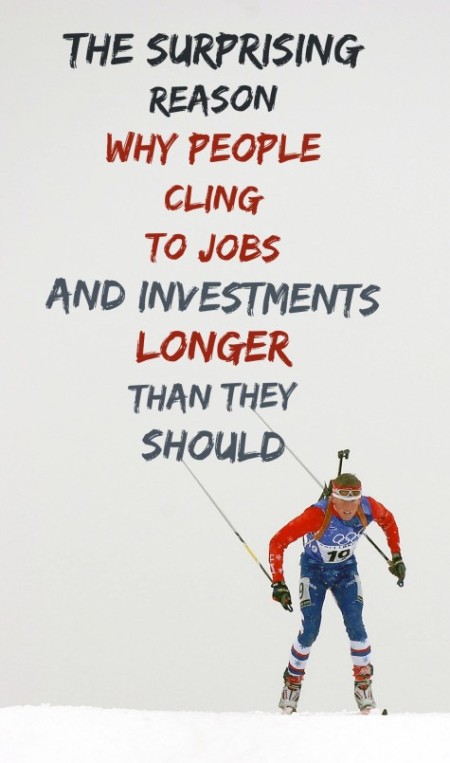
Imagine that you bought a $100 ticket to a ski resort in Michigan.
A few days later, you find a $50 deal for a ski resort in Wisconsin.
The $50 Wisconsin deal promises better ski slopes, nicer snow, and an all-around more fun experience.
On impulse, you buy that ticket, too.
Then you learn that the two ski tickets are valid only on the same day. Bummer!
The tickets are non-refundable and non-transferrable.
Other costs are equal: you’ll spend the same money and time traveling to Michigan or Wisconsin.
Imagine that you have no emotional connection to either state. No family or friends live there.
You’re faced with a certain loss: you have to sacrifice either the $100 Michigan ticket or the $50 Wisconsin ticket.
Which one would you choose?
Researchers Hal Arkes and Catherine Blumer posed this question to a team of research subjects. The majority said they’d sacrifice the $50 Wisconsin ticket, even though it promised the more fun experience.
Why?
Loss aversion. Most people prefer to minimize their losses, even if it means enduring a sub-par experience.
This is known as the “sunk cost fallacy.”
People reflect thinking along the lines this fallacy when they say, “Well, I’ve already sunk this much money/time into it. I can’t stop now.”
Would You Spend Your Last Million on a Plane?
The same researchers divided people into two groups. They posed this question to Group A:
Imagine that you’re the president of an airline company. You have a $10 million research budget. You decide to spend that money building an airplane that can’t be radar-detected.
You spend $9 million developing this plane. Before you’re finished, a competitor unveils its undetectable plane. Your competitor’s plane is faster, cheaper, stronger and better than yours.
Would you spend the last $1 million finishing out the development of your airplane?
The researchers then posed the following question to Group B:
You’re the president of an airline company. You have only $1 million left in your research budget. Someone suggests that you put that $1 million towards the development of an airplane that can’t be radar-detected.
However, you know that your competitor just released such a plane. You also know that your competitor’s plane is faster, cheaper, stronger and better than a plane you could create. Would you do it?
The scenario is the same; sunk cost is the only variable between Groups A and B. How did the two groups respond?
The vast majority of Group A – a whopping 80 percent — said yes, spend your last $1 million finishing the airplane. Less than 10 percent of Group B agreed.
Would You Get Stuck in Snow to Justify Your $12 Ticket?
Imagine this scenario:
A man wins one free baseball ticket from a radio show. He doesn’t want to attend the game alone, so he convinces his friend to buy a $12 ticket to accompany him.
On the day of the baseball game, there’s a freak springtime blizzard.
The man who won the free ticket says, “I don’t want go drive in this snow. I’m not going to the game.”
His friend, however, protests, “I don’t want to waste the $12 I paid for the ticket! I want to go!”
“The friend who purchased the ticket is not behaving rationally,” say Arkes and Blumer.
“The $12 has been paid whether one goes or not … It should in no way influence the decision to go.”
“Only incremental costs should influence decisions, not sunk costs. But who among us is so rational?”
Would You Throw Good Money After Bad?
A hungry lion crouches near a herd of zebras. He’s been waiting for more than an hour, hoping to catch his next meal.
The lion realizes he won’t catch one of these zebras. They’re too far away. They can outrun him.
Does the lion think, “Gee, I’ve already been waiting for an hour. I may as well stick around?” No, of course not.
As soon as the lion figures out that he won’t catch dinner, he leaves.
Humans are unique.
We throw good money after bad.
- We hang onto investments that we know are losers, in an effort to “see if I can break even.”
- We linger in careers that make us unhappy, since we “already put ten years into this industry.”
- We heap an additional debt onto our credit cards, since “I’m in so much debt, an extra $200 won’t matter.”
- We force ourselves to finish reading a boring book, just because “I’m already halfway through.”
The Bottom Line: Consider the sunk cost fallacy the next time you find yourself lingering in a job you don’t like, holding an investment long after the financials justify keeping it, or forcing yourself to finish a project just because you’ve started it.
The time and money you’ve sunk is irrelevant. Don’t throw good money after bad.